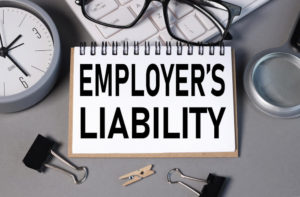Written by Malman Law, reviewed by Steve J. Malman.
In many personal injury cases, liability may seem clear depending simply on how and where a person was injured, but it isn’t always a simple determination. There are many factors to consider in more complex cases if you want to pinpoint exactly who was responsible for an injury or wrongful death. Personal injury lawyers will be able to help you figure out who is liable in a personal injury case.
In December 2009, a Marriott company party took place at a Marriott hotel in Del Mar, California. The hotel was careful about providing alcohol to guests, only giving each of them two drink tickets and serving only beer and wine. However, the bartender for the evening—who was also the general manager of the restaurant—brought an additional bottle of whiskey to the party. An employee, Michael Landri, quickly took advantage of the opportunity to drink more, and drank several shots of whiskey. At least once during the party, he also consumed a flask filled with whiskey.
Over the course of the party, Landri became so intoxicated that he could not recall driving home once sober. When he reached his home, he did
not continue to drink, but after 20 minutes he decided to drive another intoxicated co-worker home. While driving to pick the person up, he reached
speeds of over 100 miles per hour and eventually collided with another car. The other driver was killed instantly. It was later determined that Landri’s blood alcohol content was .16 at the time of the accident.
Figuring out who is liable in a case such as this may not simply result in one party being found responsible. In this case, both Landri and the Marriott hotel were found to be liable, with Landri pleading guilty to gross vehicular manslaughter while under the influence. As of 2010, Landri is serving a six-year prison sentence.
Under “respondeat superior,” employers could be held liable in part for dangerous acts committed by employees, provided the act falls within the scope of employment. Personal injury attorneys will help injury victims prove “respondeat superior” if an
employer is believed to be responsible for an employee’s behavior.
In this case, neither Landri’s intoxication nor the resulting car accident appear to fall within the scope of employment, considering he wasn’t at work when the accident occurred, the party’s attendance was voluntary, and he was at home following the party prior to the accident. After carefully reviewing the case, however, the appellate court determined that the accident
fell within the broad definition of “respondeat superior” because Landri became intoxicated at his work place during an event related to his employment.
According to the appellate court, Landri’s actions were foreseeable and Marriott should have prevented him from becoming intoxicated at the party.
If you believe an injury has occurred because of employee or employer negligence, discuss your case with a personal injury attorney who will help build your case and recover compensation from the ones who are responsible.
Malman Law’s founder Attorney Steven Malman has over 30 years of experience handling personal injury, nursing home, medical malpractice, truck accidents, car accidents, premises liability, construction, and workers’ compensation cases in Chicago, IL.
Years of experience: +30 years
Illinois Registration Status: Active and authorized to practice law—Last Registered Year: 2024
Britany Weaver
View more testimonialsCheryl Wagemann
View more testimonialsElvira G.
View more testimonialsTony S.
View more testimonialsDEVIN JONES
View more testimonialsDevin Jones
View more testimonialsAnnie Ong
View more testimonialsEugenia Cathery
View more testimonialsOmolewa Snyder
View more testimonialsTrevor Harris
View more testimonialsErnest Pitts
View more testimonialsAriel Fleming
View more testimonialsCarmen Rivera
View more testimonialsGreg Gustafson
View more testimonialsMalak St.Clair
View more testimonialsDevri Lott
View more testimonialsAdrian Lopez
View more testimonialsVanessa Leon
View more testimonialsNyah Vuljanic
View more testimonialsJeff Walker
View more testimonialsSteve Acosta
View more testimonialsAdrianna Gomez
View more testimonialsJose Cruz
View more testimonialsMeagan Cruz
View more testimonialsEddie Villarreal
View more testimonialsMadissen Miller
View more testimonialsChristina Ocon
View more testimonialsAdriana Martinez
View more testimonialsVirgil Sanner
View more testimonialsJazlyn Caraballo
View more testimonialsAshley Jenkins
View more testimonialsSchedule a free consultation with one of our experienced lawyers today by filling out the form below or call us at 1 (888) 625-6265

